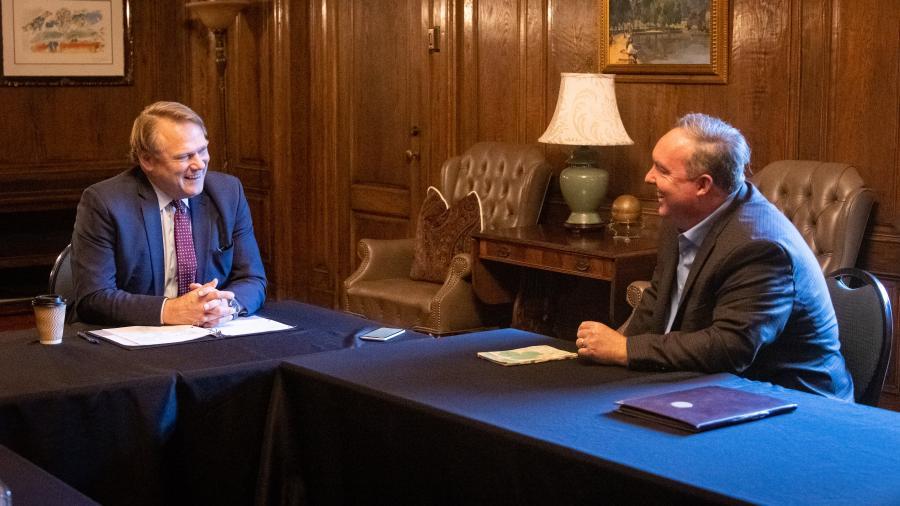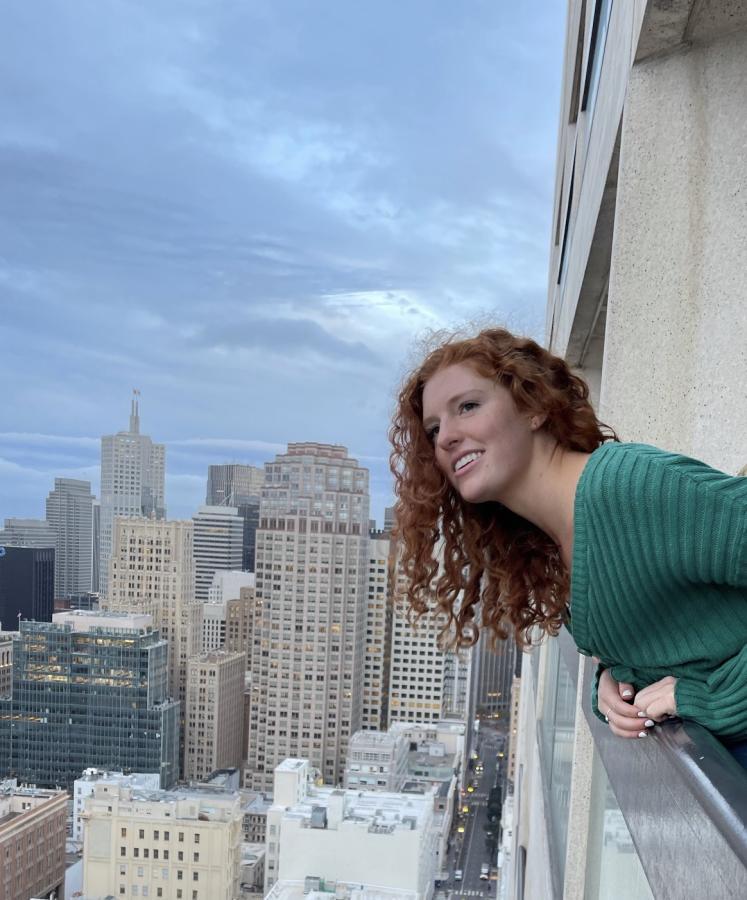Westmont Magazine Leading with Love and Service

PRESIDENT GAYLE D. BEEBE: You interviewed me on Good Life TV years ago, and now it’s my turn. Tell me about the history and work of the Turner Foundation, including your current projects.
DEAN WILSON (LAUGHING): I brought this keepsake hymnal that belonged to my grandfather, Albert J. Turner, my mother’s father. He witnessed the great Irish revival, which inspired the vision behind the foundation he started in Riverside in 1958 under the name Rose Garden Village Foundation. A traveling evangelist and tent preacher from Belfast, Northern Ireland, he immigrated in 1929. Eventually, he settled in Riverside and worked for California Baptist College as director of public relations. He had a vision for providing affordable housing for seniors. He pieced together donations to transform an empty seven-acre plot next door to Cal Baptist into a thriving 214-unit village community. It became the first project insured by the U.S. government under Section 231 of the Federal Housing Administration. My grandfather visited former President Dwight D. Eisenhower, who signed the act into law, at his retirement home in Palm Springs to tell him about the project. He also met with Governor Ronald Reagan. The development was the first of its kind with a village, a chapel, a garden and a restaurant, where my parents met. The foundation later developed a second property. My grandfather had a servant’s spirit and cared for the people there until he died in 1987.
My parents, Reverend Jon Wilson and Patty Wilson ’67, then directed the foundation and continued my grandfather’s work. Sixteen years ago, we sold both properties to Cal Baptist and moved the foundation to Santa Barbara.
BEEBE: Now that you’ve migrated the Turner Foundation to Santa Barbara, what do you hope to accomplish? What plans are underway?
WILSON: We’ve bought two apartment complexes in Santa Barbara to extend my grandfather’s vision to low-income people of all ages. The early days were a little rough, removing the drug dealers and calling the police a lot. In time, crime at the properties declined precipitously. People told us, “Don’t paint, they’ll deface the building with graffiti. Don’t plant flowers, they’ll get trampled.” But we painted, and we planted flowers, and it’s worked. We’ve seen a sense of dignity and community develop. Typically, people living in low-income apartment complexes experience a great deal of isolation, loneliness and despair. But residents of the Village of Santa Barbara know each other; they live in a community.
Fourteen years ago, the residents asked me to start a Bible study. A woman who’d had a rough life came and shared her diagnosis, and we prayed for her. She began weeping. A person who had lived in isolation for most of her life found a place to share her pain. The whole community rallied around her, taking her to appointments, bringing her groceries and cleaning her apartment. She ended up living longer than expected, and we held a celebration of life for her when she died.
In addition to renovating the properties, we created laundry facilities, a community garden and a playground. We converted space into a Community Learning Center that offers after-school tutoring, music and dance lessons, art and cooking classes, finance classes, a food bank, and more. The foundation also began an internship program with Westmont students, who volunteer at the complex.
BEEBE: A central principle of Christianity is that serving others opens a community to the power of God’s love. You’re witnessing this firsthand, right?
WILSON: The principle is leading with love. Jesus was brilliant about serving and loving. We’re there to love long-term. It’s about relationships. We want to make people’s lives better, and it’s amazing how well this has worked. My grandfather led with love and service to help people. I’ve seen hardened drug dealers and gang members turn away from their old lives. I’ve seen people in despair find a new perspective. I’ve seen kids improve their grades and attendance at school. The undergirding foundation is leading with love and service to make people’s lives better.
BEEBE: Dean, how do you sustain yourself in this? When I was in seminary, I found it incredibly discouraging to work in a homeless shelter and a drug and alcohol rehabilitation center. The director of the program told me, “You have to love them anyway know- ing that maybe only 10 percent of them will make it — and you can’t predict which 10 percent will respond.” How do you maintain your momentum, your motivation, your sense of purpose in the midst of that?
WILSON: Thank the Lord, we’re not in charge of the results. I’ve seen people go back to prison or fall off the wagon. It hasn’t been easy, but I’ve learned how to handle the work. You don’t see all the fruit, but you see little snippets, and that’s a victory. But you become comfortable with not seeing the fruit. The Turner Foundation has decided that we’re not doing social work, which has a high level of burnout. We’re just trying to serve and love people as best we can. We talk a lot about service and about relentless love that just keeps coming. Working for the Kingdom of God refreshes us, and we keep an eye on the long-term goal.
BEEBE: You can live with the challenge and persevere. That’s admirable. That’s a quality we want our students to devel- op. You have several Westmont graduates working for you. Why do you hire them?
WILSON: When I was in the brokerage business, I hired Westmont basketball players to work for me. I’ve always liked hiring Westmont students. We love this place a lot. Seven members of my family have attended here. Westmont graduates are special, and they’re great people to have on your team. I love investing in and helping people enlarge their vision for life — of what can happen. I’m always thinking about possibilities — what we could do that’s not being done, how we can bring light to the darkness.
BEEBE: I remember when you interviewed me that you had a visible joy. What’s it like to have your daughter here now? How does her experience compare to yours and the members of your family who’ve attended Westmont?
WILSON: Hannah is having an amazing experience. When she called — she was doing a gap year in Texas at the time — and told us she wanted to come to Westmont, we were so excited because of the people who are here. Our family became connected to Westmont through my grandfather. He developed a friendship with former President Roger Voskuyl and sent both my mother and my aunt to Westmont. My mother, Patty Turner Wilson, was one of the last homecoming queens at the college. She graduated in 1967, and she’s been raving about it ever since. In turn, my two brothers and I enrolled at Westmont. Jonny played basketball. I met my wife, Susan, here. She lived in the room above me in Armington B. I could hear her doing step aerobics and had to find out who was making so much noise. We went on a group hike—I’m not a hiker—and everyone kept dropping off but the two of us kept going. I wasn’t about to mess up that moment! We ended up dating and got married our senior year; it will be 25 years on January 4. We both had a great experience here, and we made lifetime friends.
(Photo: Patty Turner Wilson, center, surrounded by Lou Marshall, junior; Chris Newburgh, senior; Barbara Johnston, sophomore; and Marilyn Allen, freshman. Courtesy of the Westmont College Archives)
BEEBE: Share some highlights, challenges and enduring memories of your college experience and work here.
WILSON: The highlight of my life is being married to Susan. We had those DTR (define the relationship) moments when we were students. We have five children now, including a daughter with a severe brain injury. I’ve watched Susan lay down her life for Ella Claire, who has been a big part of our lives. She wasn’t supposed to live, she wasn’t supposed to move, and she ended up living and thriving. It’s been a joyous journey seeing my wife’s strong character as she loves and cares for our special-needs daughter. A highlight for me is bringing light to dark places, lifting people up. I love the ragamuffin gospel, as Brennan Manning described it, reaching out to the beaten-up, the bedraggled, the addicted. I love loving those people. Developing roots in God was part of my wonderful Westmont experience; it was inspiring. When I graduated, I was fired up!
BEEBE: Who are your favorite mentors, and why do they matter to you?
WILSON: One is John Wallace, a pastor in Dallas. He was a significant mentor at a critical time in my life. He never gave up on me. He believed in my vision, and he believed in me, even in rough times. I’ve also learned a lot from former chaplain Bart Tarman, who has been laser focused on Jesus for 27 years. He got me to focus on Jesus. In Dallas, I spent a year and a half sharing my crazy idea about buying apartment com- plexes, and I asked people, “If Jesus landed in Dallas-Fort Worth this afternoon, where would he go first?” I think he’d visit the dark areas where hopelessness, despair and sickness overwhelm people. He’d reach out to forgotten, invisible, often malnourished people. He’d seek to end the generational cycle of poverty, fatherlessness, violence, and incarceration. Thanks to Bart, I’ve been thinking about what Jesus would do since I was a 19-year-old student at Westmont.
Dean Wilson ’97 became president and chief exec- utive officer of the Turner Foundation in 2020. He majored in communication studies at Westmont and began his career in financial services before serving as executive director of a non-profit South- ern California organization pioneering a model for low-income housing facilities. He co-founded Behind Every Door in the Dallas-Fort Worth area, which has transformed neighborhoods in low-in- come areas. The founding CEO of THRIVE Intelli- gence, he also led several other start-up companies in the technology and security sectors. In addition, Dean served for two years as the executive director of Christian Legal Aid of Los Angeles, which pro- vides free legal service to low-income clients.
IT’S MY WESTMONT NOW
CONTINUING A LEGACY OF SERVICE: AN INTERVIEW WITH HANNAH WILSON ’23
YOUR FAMILY HAS A LONG LEGACY WITH WESTMONT. HOW HAVE YOU MADE WESTMONT YOUR COLLEGE NOW?
I’ve made Westmont my own by pursuing my passion. I’m interested in the field of psychology and potentially working in special education, a career my parents and grandparents didn’t pursue. I’ve been doing a lot of navigating and discovering more about my gifts and passions.
HOW HAS YOUR EXPERIENCE DIFFERED FROM THAT OF YOUR PARENTS AND GRANDMOTHER?
I’m participating in Westmont in San Francisco, which has been an incredible experience and one of my most transformative semesters. I’m interning with Because Justice Matters, which involves close contact and work with marginalized communities. It’s been a huge learning experience, and I’ve discovered what I want to do: work with kids who’ve experienced trauma and/or have special needs. Experiencing the Westmont community in another city has been amazing, and I’ve enjoyed stepping outside of my comfort zone.
WHY DID WESTMONT BECOME YOUR FIRST CHOICE? WHAT STOOD OUT?
I knew that I wanted to go to a school with intentional Christian community. After touring the campus and connecting with some students, Westmont obviously had that. God made it clear this was the school He wanted me to go to. Even with COVID cutting my first year short, I’ve been blessed with incredible friends, and I’m thankful for the community.
HOW WILL YOU EXTEND YOUR LEGACY?
Serving others has always been important to me and my family. I’ll take what I’ve learned here and leave Westmont with a mindset focused on serving.




